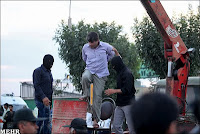 |
| Public hanging in Iran |
Human rights watchers say regime in Tehran is executing many hundreds of people, often on the flimsiest of evidence and after trials held behind closed doors.
In Iran, the country I was born in and where I lived until three years ago, public hanging is a horrific but familiar scene for many, at least for those living close to city centres and public squares. Once as a child, on my way to school, I became an inadvertent spectator of an execution, my eyes shocked at seeing the guards draping a rope around the neck of a convict. The sight has haunted me ever since.
Hanging is the common method for execution in Iran. The judicial killings usually take place in the morning as the sun rises, often at the crime scene or in a city centre. The families of victims and convicts gather as the authorities prepare to hang the condemned from cranes.
Under Iran's sharia law, the victim's family has the right to spare the convict from execution for certain crimes, such as when someone is convicted of killing another person in a car accident. This means many executions see the condemned's relatives incessantly pleading for a pardon. A huge crowd, which might include children, usually surrounds the scene.
Executions in Iran are mostly the result of grossly unfair trials which are usually held behind closed doors without the presence of a defence lawyer. Activists believe that many of those on death row were convicted on the basis of "forced confessions", a method believed to be commonly used in the country at the moment. Moreover, when a death sentence is handed down, families are often not given prior notice of the execution.
A number of crimes such as murder and rape – and even homosexuality – can send a convict to the gallows, but it is the drug-related offences that accounted for more than 80% of the killings in the country last year.
Source: Saeed Kamali Dehghan,The Observer, Sunday 16 September 2012










